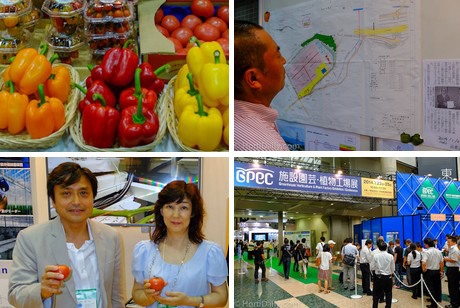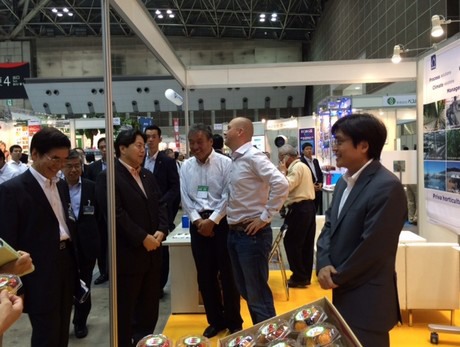During the show, the local governments of nine prefectures shared their plans that were designed in response to the new direction that Japanese Minister of Agriculture Yoshimasa Hayashi has announced. Hayashi wants to revitalize local economies by increasing local food production and decreasing energy usage. In order to do so, Japan wants to create several hubs designed for greenhouse horticulture, starting at nine locations with greenhouses of 2 to 4 hectares.

A bullet point in the design of the greenhouse projects is sustainability. In many cases the designs showed sustainable energy solutions like bio-energy and geothermal heating.
Dutch consultant Remko Bakelaar of Vijverberg Advies is closely involved in the development of one of the Japanese projects. He holds an advisory role in the preliminary stages of project design for a consortium of several parties. Amongst them are Japanese grower Richfield and the Dutch brothers Ewout and Wibo Valstar.
Richfield already has a 1.8 hectare greenhouse that is producing bell peppers. This greenhouse is initially built as a demonstration greenhouse to show Japanese farmers what can be achieved with the technology. Nowadays Richfield has become also a well-respected producer of greenhouse products as tomatoes and bell peppers.

Japanese Minister of Agriculture Yoshimasa Hayashi visiting Remko Bakelaar of Vijverberg Advies and the growers of Richfield at the GPEC 2014.
“We produce many varieties, that we ship to Japanese retailers in luxurious packaging. We experiment with several varieties and packagings each year and we experienced that the Japanese market demands more locally grown greenhouse vegetables", Richfield’s Mami Hashimoto said. "That is why we are now involved in one of the projects, we want to increase our business with this new greenhouse that will be located in Ishinomaki, in the northeastern Miyagi Prefecture."
According to Dutch advisor Remko Bakelaar, the plans are taking a while, but eventually the greenhouses will be built. "We expect to harvest the first peppers and tomatoes in this 2.4 hectare greenhouse in 2016."
At the GPEC show, Richfield's Mami Hashimoto showed us the plans of the new greenhouse. Just like their existing greenhouse, the grower plans to build another Dutch style Venlo greenhouse. “The Netherlands are steps ahead in the development of sustainable greenhouse production techniques and we believe that the rest of the world can learn a lot from them. The Dutch greenhouses are highly energy-efficient and fit exactly into the plans that the Japanese government has embarked upon in regards to increasing domestic food production and reducing energy spills.`
Click here for the photo report Hortidaily.com made at the GPEC Tokyo
